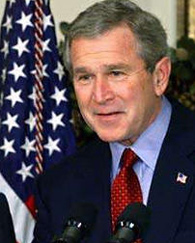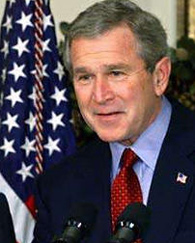"Our nation must defend the sanctity of marriage," US President George Bush said in his third State of the Union address, delivered last Tuesday night in Washington.

US President George Bush has indicated he will back a constitutional amendment banning gay marriage should "activist judges" attempt to make same-sex marriage legal.
"The outcome of this debate is important, and so is the way we conduct it," he said. "The same moral tradition that defines marriage also teaches that each individual has dignity and value in God's sight," Bush said, an apparent attempt not to entirely alienate gay voters.
In an election year in the United States, gay marriage is expected to be hotly debated on both sides of the political divide, with members of Bush's conservative Republican base demanding he make a clear statement of support for a ban.
Democrats, who generally support gay marriage, risk alienating a large bloc of their own supporters, notably blacks and Hispanics, who oppose extending further rights to homosexuals.
Gay marriage entered the US political debate last June when Canada began allowing same-sex couples to marry in the province of Ontario, then Prime Minister Jean Chretien announcing a federal law would be in place this year extending gay marriage rights across Canada. His replacement, Paul Martin, has since said he will not push legislation through parliament if it is against the wishes of the people.
The Canadian move, however, was enough to trigger fears among conservative Americans that gay US couples would avail themselves of marriage in Canada and return home demanding recognition of their licence.
Adding to debate was the decision of the US Supreme Court to strike down sodomy laws in Texas, a decision that extends to 12 other states.
"The state cannot demean their existence or control their destiny by making their private sexual conduct a crime," the justices said.
In November, the Massachusetts Supreme Judicial Court ruled as unconstitutional state laws prohibiting same sex couples from marrying, but gave the state legislature 180 days to either change the law or change the constitution.
Barring an individual from the protections, benefits and obligations of civil marriage solely because that person would marry a person of the same sex violates the Massachusetts Constitution," the court said.

US President George Bush has indicated he will back a constitutional amendment banning gay marriage should "activist judges" attempt to make same-sex marriage legal.
A poll conducted before the Massachusetts ruling showed that 59 per cent of Americans oppose gay marriage and 51 per cent are against same-sex civil unions.
Former US President Bill Clinton passed during his administration in 1996 the Defense of Marriage Act, which bars recognition of gay marriage at the federal level. It further provides that no state is required to recognise the law of another state in respect to same-sex marriage and defines marriage as being between one man and one woman for federal purposes.
An amendment of the Constitution, as supported by Bush, would remove the issue from the purview of the courts. Observers noted, however, that only 27 amendments have been approved in more than 200 years.
In the meantime, legislators in at least nine states - including Arizona, Georgia, Indiana, Oklahoma, Kentucky and Michigan are pushing for new, more sweeping measures in hopes of preventing any ripple effect from laws and court rulings elsewhere, despite already having laws barring same-sex marriage.
If Ohio enacts its pending Defense of Marriage act (that say marriage can only be between a man and a woman) as expected, only 12 states, including Massachusetts, would be without one. The others are Connecticut, Maryland, New Hampshire, New Jersey, New Mexico, New York, Oregon, Rhode Island, Vermont, Wisconsin and Wyoming.
The British Parliament is this year expected to pass legislation covering same-sex civil partnerships.
Taiwan, which had been expected to introduce legislation recognising same-sex couples late last year, may still do so ahead of presidential elections due in March.
A gay couple in Hong Kong is in coming months expected to launch a human rights challenge for recognition by the Special Administrative Region of their Canadian marriage.
